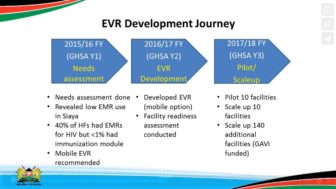Nov 2, 2018
BLN/Gavi Data Quality and Use Collaborative: Call for Expressions of Interest
eHealth, eHealth Plan, GAVI, Peer Learning, People, Policies
Global
Oct 26, 2018
Introducing the BLN/Gavi Data Quality and Use (BLN DQU) Collaborative
GAVI, Immunization Registry, Peer Learning, People, Policies, Practices
Oct 22, 2018
BID Regional Program Concept Note
eHealth, Immunization Registry, mHealth, Peer Learning, People, Policies
Global
Jul 6, 2018
BID Initiative lessons learned encyclopedia
PATH
Applications, Barcodes, eHealth, Hardware, Immunization Registry, Packaging, People, Policies, Products, Stock Management, Supportive Supervision, Tools, Training
Tanzania, Zambia
Jan 24, 2014
BID Initiative Landscape Analysis: Annex 2
The landscape analysis of existing projects reviews past and current approaches, strategies and interventions employed to drive the use of data among managers and decision makers for improved organizational performance and resource allocation. This is Annex 2 of the landscape analysis, which includes project details.Jan 24, 2014
BID Initiative Literature Review: Improving Data Quality and Promoting the Use of Data for Decision Making
This literature review was conducted to identify, review, and analyze published and grey literature to inform the behavior, organization, and practice activities to be conducted as part of the BID Initiative, and to inform the Initiative’s theory of change and monitoring and evaluation plan. The overall hypothesis of the BID Initiative is that design and national-scale implementation of a defined technology platform and supporting activities will improve data quality and use to strengthen decision making related to immunization programs. This literature review will be used to expand and ground this hypothesis and guide the development of a theory of change.May 1, 2015
BID Initiative Scale Theory of Change | Primary Outcomes 3 & 4
The BID Initiative Theory of Change (ToC) document focuses on Primary Outcomes 3 and 4 of the BID Initiative. This narrative elaborates on the problem statement, BID Initiative hypotheses related to scaling and diffusing of solutions developed and tested to address data quality and use challenges, and the strategic approaches taken to scale within demonstration countries and across the Sub-Sahara Africa region. This ToC includes a graphic (Appendix 1) and a literature review (Appendix 2) that validate many of the assumptions included in the ToC narrative. It is important to note that this ToC is complimentary to that of Primary Outcomes 1 and 2 (ToC1) of the BID Initiative and is not intended to be a standalone document.Jan 28, 2014
BID Initiative Landscape Analysis: Current and Past Projects Targeting Data Quality and Use
The landscape analysis of existing projects reviews past and current approaches, strategies and interventions employed to drive the use of data among managers and decision makers for improved organizational performance and resource allocation. The objectives of this review are to inform the Behavior, Organization, and Practices (BOP) activities in BID Phase I, explore links between BOP and the area of work that rests within the Product Vision Team, and contribute to defining the Initiative’s theory of change and M&E plan.May 1, 2018
WHO Classification of Digital Health Interventions v1.0
The WHO Classification of Digital Health Interventions (DHIs) categorizes the different ways in which digital and mobile technologies are being used to support health system needs. Historically, the diverse communities working in digital health—including government stakeholders, technologists, clinicians, implementers, network operators, researchers, donors— have lacked a mutually understandable language with which to assess and articulate functionality. A shared and standardized vocabulary was recognized as necessary to identify gaps and duplication, evaluate effectiveness, and facilitate alignment across different digital health implementations. Targeted primarily at public health audiences, this Classification framework aims to promote an accessible and bridging language for health program planners to articulate functionalities of digital health implementations. The WHO Classifications of Digital Health Interventions v1.0 is the result of a multi-year process of development and refinement guided by a panel of global experts, including those from the Health Data Collaborative Digital Health and Interoperability Working Group. For more information about this resource, visit the WHO website.
Mar 30, 2018
BLN Webinar: Electronic Immunization Registry – Lessons from Kenya
Immunization Registry, People, Policies
The BID Learning Network (BLN) invites you to join a webinar entitled “Electronic Immunization Registry: Lessons from Kenya.” In this webinar, the presenter shares the electronic immunization registry (EIR) implementation milestones in Kenya by providing an overview, the situation analysis process, limitations, achievements and lessons learned. The audience learns about the implementation approach that Kenya has used, its partnership program, as well as the customization and development process of the EIR.
Jump in. Expand your knowledge.
Events
No upcoming events.
